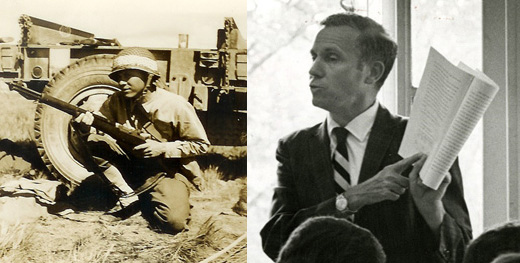When Russell County native and retired WKU history professor Lowell H. Harrison died on October 12, he left behind a distinguished record of teaching and scholarship, having written or edited some 15 books, published more than 100 articles and authored hundreds of book reviews. Like many WKU faculty, staff and students, he also left behind an honorable record of military service. During World War II, Harrison trained at Fort Knox, Kentucky and Camp Carson, Colorado, and served overseas as a combat engineer with the 104th Division.
In common with many of his fellow WKU students, Harrison kept up a wartime correspondence with classmates and teachers back on the Hill. His letters, saved by their recipients and now housed in several collections in WKU’s Special Collections Library, show that the rigors of military service never dampened his dry wit or dulled his intellectual curiosity. In August 1944, Harrison sent student Dorthie Hall a photograph of himself in combat-ready pose with the identification, “I’m the one supported by the rifle.” In language that hinted at the narrative skill he would display as a historian, he also told Dorthie about his visit to the Colorado town of Cripple Creek. “The hills are dotted with dark tunnels which belched impossibly rich gold ore only a half century ago,” he wrote. “The town boomed, and the world’s greatest poker game saw stakes totaling over a million.” Eventually, “the flow of ore became a thin trickle as the source vanished.” Residents departed, and “as the years fled by, the drifts of winter snow slipped through more and more open doors and gaping windows,” leaving the town to reinvent itself and “cater to the tourist trade, undisturbed by the ghosts of old prospectors who pick away at promising formations at the ghost town of Cripple Creek.”
Read Lowell Harrison’s World War II letters in the Dorthie A. Hall Collection, the Frances Richards Collection, and the Gabrielle Robertson Collection at WKU’s Special Collections Library. Click on the collection names to download finding aids. To find more collections of war letters (from the Civil War through Iraq and Afghanistan), search TopScholar and KenCat.

